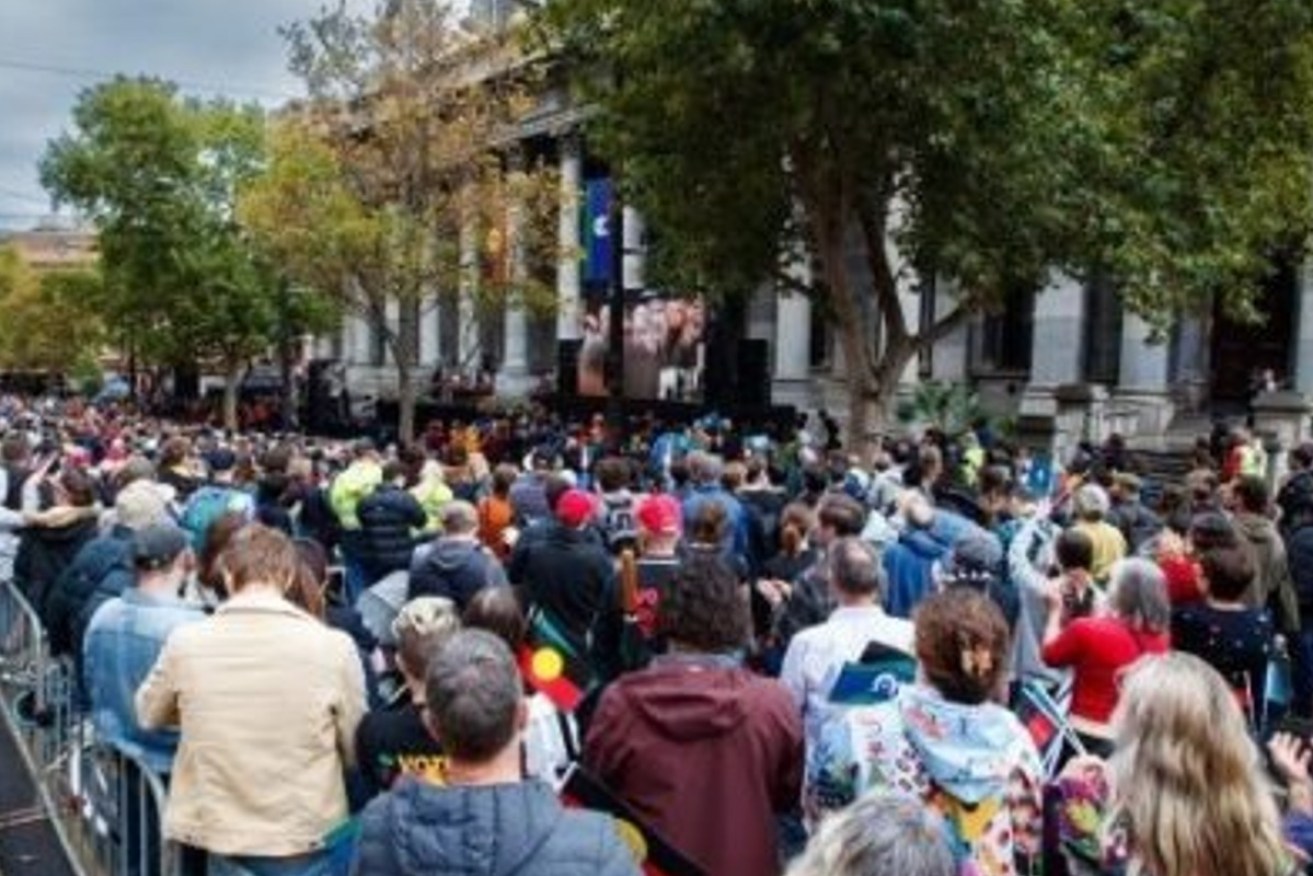SA candidates speak up for First Nations Voice
More than 100 candidates have nominated for positions on Local First Nations Voices across South Australia, with elections to be held in March as part of the First Nations Voice to state parliament.


A crowd on North Terrace outside Parliament House on March 26 last year after the passing of First Nations Voice Act legislation. Photo: AAP
The Electoral Commission of South Australia on Monday held the Declaration of Nominations for the ballot, with 113 candidates putting their hands up for positions on six Local Voices.
ECSA said that 55 per cent of candidates were women and enough nominations were received for elections to be held for all six regions on Saturday, March 16, with early voting from Wednesday, March 6.
Each candidate will be an Aboriginal or Torres Strait Islander living in SA and be elected by First Nations people only from each region.
Five of the six Local Voice regions will have seven elected members, while the Central region, centred on Adelaide, will have 11 members due to the greater population, for a total of 46 positions.

The six Local First Nations Voice regions across South Australia.
The state government’s State First Nations Voice website says Local Voices will hear about issues that matter to local Aboriginal and Torres Strait Islanders, engage with local councils, government and other agencies and pass its views on to the State First Nations Voice.
Local Voices will also set up advisory committees comprising non-elected members, to hear the views of specific groups on issues such as Native Title and Stolen Generations.
Two presiding members from each Local First Nations Voice will represent their region on the State First Nations Voice, which will “form state-wide views and positions that represent the diversity of First Nations people in South Australia” and “present views and priorities to the South Australian Parliament, Ministers and government Chief Executives”.
The state government’s website says the elected body will meet with state Cabinet at least twice a year, but highlights that it “will not have any powers to veto legislation or stop Parliament undertaking its duties and functions”.
The government says the SA-based Voice, set up with legislation which passed parliament in March 2023, relates only to this state and is different to the federal model which failed at the October referendum.
The Malinauskas Government originally planned to hold the State Voice ballot on September 9 last year, but it was postponed for six months among speculation that confusion and politicking around the federal referendum was muddying the waters.
South Australia was considered a crucial swing state needed to get the federal Yes vote over the line but it recorded a 61.4 per cent No vote at the referendum, compared with 28.6 per cent for Yes.
Attorney-General and Aboriginal Affairs Minister Kyam Maher said after nominations were declared that the First Nations Voice to State Parliament was “a new way of doing things that we hope will lead to better outcomes for Aboriginal and Torres Strait Islander communities in South Australia”.
“It’s clear that enforcing decisions from the top down, without meaningful input and discussion with Aboriginal and Torres Strait Islander communities, hasn’t worked and does not help to address the disproportionate level of disadvantage experienced,” he said.
“Listening to what these communities have to say, and factoring that voice into our decision making, can lead to better outcomes not just for Aboriginal and Torres Strait Islander people, but for the broader South Australian community as a whole.”
Commissioner for First Nations Voice Dale Agius said that throughout the process he had “been impressed by the wide variety of people who are clearly passionate about improving the lives of Aboriginal South Australians”.
“I’d like to commend all of those who have chosen to nominate and wish them all the best as they campaign to be a part of this incredible, once-in-a-generation opportunity,” he said.
Opposition Aboriginal Affairs spokesman Josh Teague said the Liberal Party had opposed both the federal and state Voices last year and that the SA Voice “will cost taxpayers $1.5 million a year”.
Teague said that 113 nominations for 46 positions was “a disappointing result which could reflect Peter Malinauskas’ disinterest in the topic now” in the wake of the failed federal referendum.
“Many could be questioning whether Peter Malinauskas even has faith in his own legislation now and it could be that the number of nominations reflect this,” he said.




